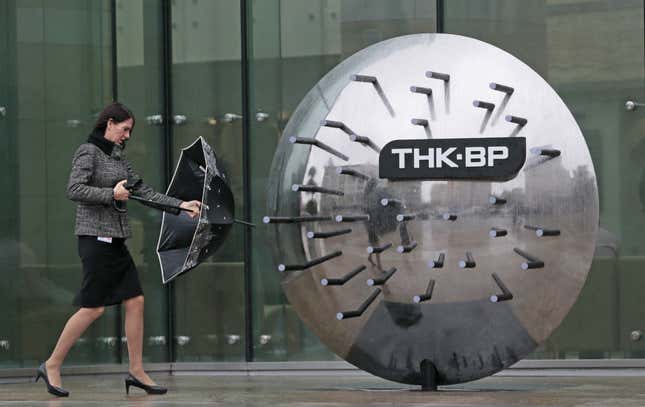
BP’s board of directors has approved the sale of the company’s 50% stake in Russia’s third-largest oil company to state-controlled Rosneft in a cash-and-shares deal worth as much as $27 billion, say people with knowledge of the deal.
The agreement ends a bitter and, for BP, sometimes frightening 14-year partnership with four Russian oligarchs. But the drama only begins for the oligarchs themselves, who must now figure out how to deal with a new partner not as easy manipulated as BP: the Russian state.
The BP board vote to sell the 50% stake in TNK-BP came Oct. 19 but didn’t leak out until Oct. 21 in a report by the Financial Times. In details reported by the newspaper and confirmed by a person familiar with the agreement, Rosneft will pay BP $11 billion to $13 billion in cash, plus Rosneft shares worth $11 billion to $14.7 billion.
That means BP would end up owning 15% to 20% of Rosneft, a perch that BP hopes will lead to a new day for the company in Russia, including a premier role in future prized Russian oil and gas deals. The cash will also be much coveted by BP, which still faces large fines in the US stemming from the 2010 Macondo oil spill. BP and Rosneft chief Igor Sechin must now work out the final details and obtain formal agreement from the Kremlin.
BP announced in June that it would get out of TNK-BP after years of fighting with AAR, as the oligarchs call themselves. It was never clear in their frequent dust-ups who was in the right, only that BP usually ended up losing. In a much-discussed 2008 row, BP CEO Bob Dudley, then heading TNK-BP’s operations in Russia, fled underground for several months in fear of his life.
As for the oligarchs, they have said they have no interest in remaining in TNK-BP if Rosneft is their partner. Their stated reason is that Rosneft is not well-run and pays miserly dividends. But another rationale for getting out is Sechin’s role at Rosneft. In 2011, the oligarchs embarrassed Sechin by successfully suing to upend a blockbuster Arctic oil exploration accord he had reached with BP.
On Oct. 16, Sechin and AAR signed a memorandum of understanding to sell their stake to Rosneft. But now that the BP deal is virtually done, he could reap revenge on AAR by insisting on more favorable terms, such as a lower sale price and stretched out payments that could make the oligarchs sweat and force them to remain on their best behavior for years.
A person familiar with the oligarchs’ thinking said that Sechin will not act out of malice. “I think he is quite rational,” the person said. Still, there was no knowing with certainty that Sechin will proceed with the purchase of AAR’s half. “One can never be sure,” the person said.
If Sechin decides not to go ahead with the AAR deal, the oligarchs could be in a nightmare scenario, facing either much-weakened leverage in an open market sale or a long-term partnership with Rosneft that it does not want.